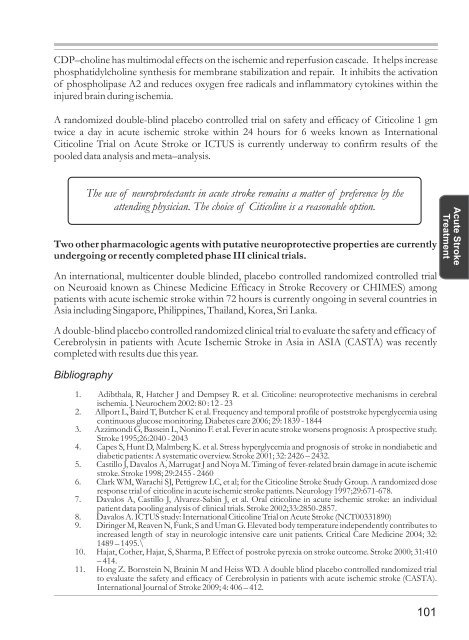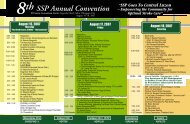Front Panel Painting “LIFE” By William T Chua MD
FREE download - Stroke Society of the Philippines
FREE download - Stroke Society of the Philippines
You also want an ePaper? Increase the reach of your titles
YUMPU automatically turns print PDFs into web optimized ePapers that Google loves.
CDP–choline has multimodal effects on the ischemic and reperfusion cascade. It helps increase<br />
phosphatidylcholine synthesis for membrane stabilization and repair. It inhibits the activation<br />
of phospholipase A2 and reduces oxygen free radicals and inflammatory cytokines within the<br />
injured brain during ischemia.<br />
A randomized double-blind placebo controlled trial on safety and efficacy of Citicoline 1 gm<br />
twice a day in acute ischemic stroke within 24 hours for 6 weeks known as International<br />
Citicoline Trial on Acute Stroke or ICTUS is currently underway to confirm results of the<br />
pooled data analysis and meta–analysis.<br />
The use of neuroprotectants in acute stroke remains a matter of preference by the<br />
attending physician. The choice of Citicoline is a reasonable option.<br />
Two other pharmacologic agents with putative neuroprotective properties are currently<br />
undergoing or recently completed phase III clinical trials.<br />
An international, multicenter double blinded, placebo controlled randomized controlled trial<br />
on Neuroaid known as Chinese Medicine Efficacy in Stroke Recovery or CHIMES) among<br />
patients with acute ischemic stroke within 72 hours is currently ongoing in several countries in<br />
Asia including Singapore, Philippines, Thailand, Korea, Sri Lanka.<br />
A double-blind placebo controlled randomized clinical trial to evaluate the safety and efficacy of<br />
Cerebrolysin in patients with Acute Ischemic Stroke in Asia in ASIA (CASTA) was recently<br />
completed with results due this year.<br />
Bibliography<br />
1. Adibthala, R, Hatcher J and Dempsey R. et al. Citicoline: neuroprotective mechanisms in cerebral<br />
ischemia. J. Neurochem 2002: 80 : 12 - 23<br />
2. Allport L, Baird T, Butcher K et al. Frequency and temporal profile of poststroke hyperglycemia using<br />
continuous glucose monitoring. Diabetes care 2006; 29: 1839 - 1844<br />
3. Azzimondi G, Bassein L, Nonino F. et al. Fever in acute stroke worsens prognosis: A prospective study.<br />
Stroke 1995;26:2040 - 2043<br />
4. Capes S, Hunt D, Malmberg K. et al. Stress hyperglycemia and prognosis of stroke in nondiabetic and<br />
diabetic patients: A systematic overview. Stroke 2001; 32: 2426 – 2432.<br />
5. Castillo J, Davalos A, Marrugat J and Noya M. Timing of fever-related brain damage in acute ischemic<br />
stroke. Stroke 1998; 29:2455 - 2460<br />
6. Clark WM, Warachi SJ, Pettigrew LC, et al; for the Citicoline Stroke Study Group. A randomized dose<br />
response trial of citicoline in acute ischemic stroke patients. Neurology 1997;29:671-678.<br />
7. Davalos A, Castillo J, Alvarez-Sabin J, et al. Oral citicoline in acute ischemic stroke: an individual<br />
patient data pooling analysis of clinical trials. Stroke 2002;33:2850-2857.<br />
8. Davalos A. ICTUS study: International Citicoline Trial on Acute Stroke (NCT00331890)<br />
9. Diringer M, Reaven N, Funk, S and Uman G. Elevated body temperature independently contributes to<br />
increased length of stay in neurologic intensive care unit patients. Critical Care Medicine 2004; 32:<br />
1489 – 1495.\<br />
10. Hajat, Cother, Hajat, S, Sharma, P. Effect of postroke pyrexia on stroke outcome. Stroke 2000; 31:410<br />
– 414.<br />
11. Hong Z. Bornstein N, Brainin M and Heiss WD. A double blind placebo controlled randomized trial<br />
to evaluate the safety and efficacy of Cerebrolysin in patients with acute ischemic stroke (CASTA).<br />
International Journal of Stroke 2009; 4: 406 – 412.<br />
101<br />
Acute Stroke<br />
Treatment



